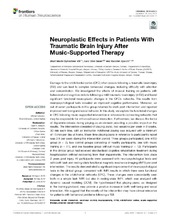| dc.contributor.author | Vik, Berit | |
| dc.contributor.author | Skeie, Geir Olve | |
| dc.contributor.author | Specht, Karsten | |
| dc.date.accessioned | 2020-03-19T13:51:54Z | |
| dc.date.available | 2020-03-19T13:51:54Z | |
| dc.date.issued | 2019 | |
| dc.Published | Vik B, Skeie GO, Specht K. Neuroplastic effects in patients with traumatic brain injury after music-supported therapy. Frontiers in Human Neuroscience. 2019;13:177 | eng |
| dc.identifier.issn | 1662-5161 | |
| dc.identifier.uri | https://hdl.handle.net/1956/21540 | |
| dc.description.abstract | Damage to the orbitofrontal cortex (OFC) often occurs following a traumatic brain injury (TBI) and can lead to complex behavioral changes, including difficulty with attention and concentration. We investigated the effects of musical training on patients with behavioral and cognitive deficits following a mild traumatic brain injury (mTBI) and found significant functional neuro-plastic changes in the OFC’s networks. The results from neuropsychological tests revealed an improved cognitive performance. Moreover, six out of seven participants in this group returned to work post intervention and reported improved well-being and social behavior. In this study, we explore the functional changes in OFC following music-supported intervention in reference to connecting networks that may be responsible for enhanced social interaction. Furthermore, we discuss the factor of dopamine release during playing as an element providing a possible impact on the results. The intervention consisted of playing piano, two sessions per week in 8 weeks, 30 min each time, with an instructor. Additional playing was required with a minimum of 15 min per day at home. Mean time playing piano in reference to participant’s report was 3 h per week during the intervention period. Three groups participated, one mTBI group (n = 7), two control groups consisting of healthy participants, one with music training (n = 11), and one baseline group without music training (n = 12). Participants in the clinical group had received standardized cognitive rehabilitation treatment during hospitalization without recovering from their impairments. The intervention took place 2 years post injury. All participants were assessed with neuropsychological tests and with both task and resting-state functional magnetic resonance imaging (fMRI) pre-post intervention. The results demonstrated a significant improvement of neuropsychological tests in the clinical group, consistent with fMRI results in which there were functional changes in the orbitofrontal networks (OFC). These changes were concordantly seen both in a simple task fMRI but also in resting-state fMRI, which was analyzed with dynamic causal modeling (DCM). We hypothesized that playing piano, as designed in the training protocol, may provide a positive increase in both well-being and social interaction. We suggest that the novelty of the intervention may have clinical relevance for patients with behavioral problems following a TBI. | en_US |
| dc.language.iso | eng | eng |
| dc.publisher | Frontiers | eng |
| dc.rights | Attribution CC BY | eng |
| dc.rights.uri | http://creativecommons.org/licenses/by/4.0 | eng |
| dc.title | Neuroplastic effects in patients with traumatic brain injury after music-supported therapy | eng |
| dc.type | Peer reviewed | |
| dc.type | Journal article | |
| dc.date.updated | 2019-11-14T16:57:01Z | |
| dc.description.version | publishedVersion | |
| dc.rights.holder | Copyright 2019 The Author(s) | eng |
| dc.identifier.doi | https://doi.org/10.3389/fnhum.2019.00177 | |
| dc.identifier.cristin | 1721442 | |
| dc.source.journal | Frontiers in Human Neuroscience | |

